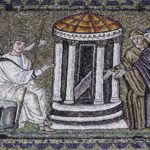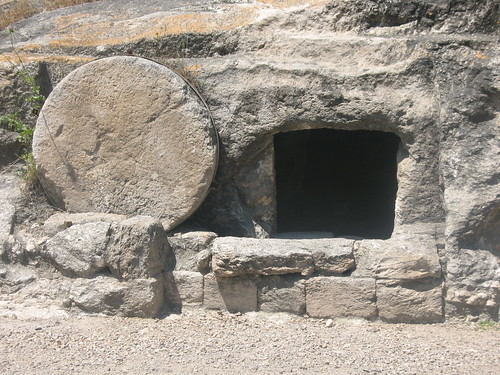We run our website the way we wished the whole internet worked: we provide high quality original content with no ads. We are funded solely by your direct support. Please consider supporting this project.
8 Arguments for the Reality of the Resurrection
James Emery via Compfight
As we come up on Easter many ask questions about the reliability of the resurrection story. Was it a legend? Did the early church fabricate it? Can we trust what we read in the Bible and what we hear preached?
Greg has written extensively on this topic. In his best-selling book Letters from a Skeptic, Greg responds to these questions:
____________________________________________
- The resurrection event is testified to by five independent sources (Matthew, Mark, Luke, John, and Paul — who referred to the numerous other sources as well, such as Peter and James and first Corinthians 15). …
- The location of Jesus’s tomb was well-known by all, so if Jesus had not risen from the dead, if his body were yet in the tomb, this could have been easily checked out. But Jesus’ followers (who would suffer persecution for their faith) and the opponents of Jesus (who would want to falsify the Christian claim) would have a motive for checking this out. But all agree, the tomb was empty. How is this agreement to be explained?
- Related to #2, no one disputes that the Christian church began in Jerusalem just a few weeks after Jesus’ crucifixion. It exploded in growth. And the content of the message that causes this explosion was that Jesus was the Messiah, the Lord of all, as was evidenced by his miracles and resurrection from the dead (see Acts 2:22–24). They do not present to their audience some unknown figure in the distant past. They’re talking about one of their audience’s contemporaries! How is this growth to be explained?
- The resurrection narratives lack the characteristics common to late legendary narratives, and embody many of the characteristics common to early eyewitness based reports. There is, for example, much detail, much of it being irrelevant to the storyline. To give one illustration, Mark mentions the name of the well-known member of the Sanhedrin (a Jewish councilman) who donated his tomb for Jesus — Joseph of Arimathea. Now if one is going to fabricate an account, one doesn’t create this sort of detail. One certainly doesn’t drop names of such prominent people, people who can easily be cross examined. …
- The conversion of Paul is unexplainable except on the basis he himself gives: he confronted the risen Lord (see Acts 9 and 1 Corinthians 15). Here was a man dead set against Christianity, even overseeing the stoning of one of its preachers, and then one moment he’s converted. Similarly, James, the brother of Jesus, was also a nonbeliever in Jesus until the Lord appeared to him (1 Corinthians 15:7). …
- Paul gives us an early list of the Resurrection appearances. It’s found in 1 Corinthians 15, written about 15 to 20 years after the resurrection. He is here attempting to convince some Corinthians that the resurrection of Jesus did in fact occur, and to do this he lists Christ’s appearances to the apostles, and to James, and “to more than 500 at the same time, most of whom are still living” (1 Corinthians 15:6). The thrust of noting the larger number of living people who saw Christ resurrected is to say, “If you don’t believe me, the evidence is still around. Go and ask those who saw it.” By the standard of any law court, this must be taken as strong evidence.
- There’s no way of accounting for the transformation of the disciples except on the basis of the resurrection, the very basis they themselves give. If you compare the disciples before the death of Jesus with the disciples after the resurrection appearances, you will see a world of difference. One day they are fearful and hiding; the next day they are facing hostile audiences, preaching the resurrection.
- Finally, there is no motive for the disciples to fabricate the story. They had nothing to gain and everything to lose. Nor is there anything to lead us to believe that they were disposed to fabricate such a story, or had the sort of characters which would be capable of such an incredible fabrication. Nor is there anything to suggest that they could have successfully pulled such an incredible fabrication off, even if they had wanted to.
In short, the denial of the resurrection has nothing to recommend itself as a historical hypothesis, while the admittance of the resurrection has everything to recommend itself as a historical hypothesis. (127-130)
Category: General
Tags: Apologetics, Easter, Letters from a Skeptic, Resurrection
Topics: Apologetics
Related Reading

What the Resurrection Says About the Cross
As with every other aspect of Jesus’ life and ministry, even the resurrection must be understood in light of the cross. This event was not just the resuscitation of a random corpse. It was the resurrection of the Incarnate Son of God who had fulfilled the human side of the God-human covenant by living a sinless…

The Jesus Story is a Myth!…And History
Image by Len dela Cruz The Jesus story has a curious, and fascinating, relationship with myth and legend. The story of God coming to earth, being born of a virgin, manifesting a heroic, counter-cultural love toward outcasts, dying for the people who crucified him and then rising from the dead has a familiar “echo” to it.…

Is God Personal?
Hamed Saber via Compfight How can we trust that God is personally involved in our lives? Are our seemingly “small” lives significant enough for God to get involved when you consider the vastness of all that goes on in the cosmos. These are common question raised by skeptics and seekers. In Letters from a Skeptic,…

Podcast: Should We Expose Santa and the Easter Bunny as Frauds to Our Kids?
Greg pulls back the curtain on holiday fraud in this disenchanting roller coaster of an episode. http://traffic.libsyn.com/askgregboyd/Episode_0297.mp3

Podcast: Does the Resurrection Diminish the Sacrifice of Jesus?
Greg discusses God’s sacrifice, the nature of separation from God, and shares a powerful story from his time in Cambodia, and offers this as an analogy for Christ’s inner sacrifice. http://traffic.libsyn.com/askgregboyd/Episode_0155.mp3

Jesus: True Myth and True History
Though the Jesus story gives us every reason to believe it is substantially rooted in history, it has a curious, and fascinating, relationship with myth and legend. The story of God coming to earth, being born of a virgin, manifesting a heroic, counter-cultural love toward outcasts, dying for the people who crucified him and then…

